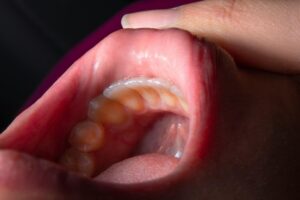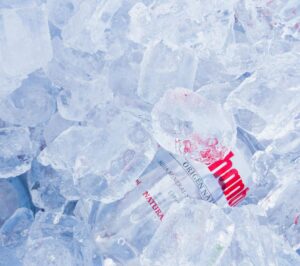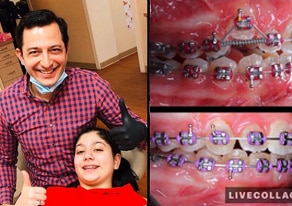1. Rinse with a Warm Saltwater Solution

This is a classic remedy because it actually works. A warm saltwater rinse can help clean the sore, reduce swelling, and speed up the healing process.
Why It Works
Saltwater helps draw out fluids and bacteria from the irritated area. It also creates a gentle environment for the sore to heal without added chemicals or harsh ingredients.
How to Use It
-
Mix 1 teaspoon of salt into a cup of warm water
-
Swish the solution around your mouth for about 30 seconds
-
Do this 2–3 times a day, especially after meals
Extra Tip
Don’t rinse right after brushing your teeth. Let your toothpaste sit for a bit before using the saltwater, so you don’t wash away the fluoride.
Saltwater rinses are easy, cheap, and effective—and they’re a great first step in treating mouth sores from braces.
2. Use Orthodontic Wax to Reduce Friction
When braces constantly rub against the inside of your mouth, sores are almost guaranteed. Orthodontic wax is one of the simplest ways to stop that rubbing and give your mouth a chance to heal.
How It Helps
Wax covers the parts of your braces that are causing irritation. It creates a barrier between the bracket or wire and the soft tissue in your mouth. This gives existing sores time to recover and helps prevent new ones from forming.
How to Apply It
Follow these quick steps for best results:
-
Wash your hands
-
Dry the area on your braces using a tissue or gauze
-
Pinch off a small piece of wax and roll it into a ball
-
Press it gently onto the bracket or wire that’s bothering you
-
Smooth it out so it stays in place
When to Use It
-
Before meals, if you’re prone to soreness
-
During sleep, to reduce overnight irritation
-
Right after adjustments, when soreness is more common
Don’t reuse the same piece of wax. Throw it out and apply fresh wax as needed.
Using wax consistently can make a huge difference when dealing with mouth sores from braces. It’s one of the easiest and most effective tools to have on hand during treatment.
3. Apply a Mouth Sore Gel or Topical Anesthetic
When the pain from mouth sores gets in the way of eating or talking, a gel or topical anesthetic can offer quick relief. These products numb the area and help protect the sore while it heals.
What to Use
Over-the-counter options are easy to find at most drugstores. Look for products labeled for oral pain relief. Some popular choices include:
-
Orajel
-
Anbesol
-
Canker-X
-
Benzocaine-based gels
These treatments often contain ingredients that reduce pain and coat the sore to limit irritation.
How to Apply
-
Wash your hands before use
-
Use a cotton swab or clean finger to apply a small amount to the sore
-
Avoid eating or drinking for a few minutes afterward so the gel can set
Things to Keep in Mind
-
Only use the product as directed on the label
-
Don’t overapply—using too much won’t make it heal faster
-
If the area becomes more irritated, stop use and contact your orthodontist
When used correctly, a mouth sore gel can ease discomfort and make everyday tasks feel more manageable. It’s a helpful option for anyone dealing with painful mouth sores from braces.
4. Try Antibacterial Mouthwash for Cleaner Healing
Keeping your mouth clean is key when dealing with open sores. Using an antibacterial mouthwash can help prevent infection and keep the healing process on track.
Why It Works
Mouth sores from braces are more likely to get worse if bacteria build up around them. Antibacterial rinses lower the risk of infection and reduce inflammation, which helps the sore heal more quickly.
What to Look For
Not all mouthwashes are the same. Choose one that is:
-
Alcohol-free (to avoid stinging)
-
Labeled as antibacterial or antiseptic
-
Approved by the ADA (American Dental Association)
Some orthodontists also offer medicated rinses for people who deal with frequent or stubborn sores.
How to Use It
-
Rinse with the mouthwash after brushing, usually twice a day
-
Swish for the amount of time listed on the label (usually 30–60 seconds)
-
Avoid rinsing with water afterward so the ingredients stay active longer
Using an antibacterial mouthwash is a simple step that supports everything else you’re doing to treat mouth sores from braces. It keeps the area clean and reduces your chances of complications.
5. Stick to a Soft-Food Diet
When you’re dealing with mouth sores from braces, the last thing you want is to make the pain worse by eating rough or spicy foods. Switching to softer options can help you avoid extra irritation and give your mouth a chance to heal.
Why It Matters
Crunchy chips, hard bread, or acidic foods can scrape or inflame already sensitive areas. By choosing soft foods, you’re reducing friction and pressure inside your mouth. This makes healing faster and less painful.
What to Eat
Here are some easy-to-chew options that won’t aggravate sore spots:
-
Mashed potatoes
-
Scrambled eggs
-
Yogurt
-
Applesauce
-
Smoothies
-
Oatmeal
-
Soft pasta
-
Rice
These foods are not only gentle but also easy to prep and full of nutrients that support healing.
What to Avoid
-
Chips and crusty bread
-
Citrus fruits and juices
-
Spicy sauces
-
Nuts and seeds
-
Crunchy vegetables (unless cooked very soft)
Even a few days on a soft-food diet can make a big difference when dealing with mouth sores from braces. Once the area feels better, you can slowly bring back more texture into your meals.
6. Stay Hydrated and Avoid Acidic Drinks

Staying hydrated helps your body heal faster, and that includes the tissues in your mouth. When you’re dealing with mouth sores from braces, keeping your mouth moist can reduce irritation and support recovery.
Why Hydration Helps
Dry mouth can make sores worse and slow down healing. Water helps rinse away food particles and keeps the mouth’s natural defenses working properly.
Best Drinks for Healing
Stick with these options to stay hydrated without making sores worse:
-
Plain water
-
Herbal teas (unsweetened)
-
Milk
-
Coconut water (low in sugar)
These are soothing and won’t irritate sore spots.
What to Avoid
Some drinks can make mouth sores sting or swell:
-
Citrus juices (orange, lemon, grapefruit)
-
Soda
-
Sports drinks with high acidity
-
Coffee and black tea (if they dry out your mouth)
Quick Tip
Use a straw if you want to drink something cold or slightly irritating. It helps limit contact with the sore.
Drinking enough water each day can make a clear difference in how quickly you heal from mouth sores from braces. It’s a small habit that supports everything else you’re doing.
7. Use Ice Packs or Cold Foods to Soothe Pain
Cold can offer quick relief when mouth sores from braces start to hurt. It helps reduce swelling, numbs the area, and brings down irritation without using medication.
How Cold Helps
Cold temperatures slow blood flow to the sore, which reduces inflammation and dulls the pain. It’s especially helpful right after the sore appears.
Easy Ways to Apply Cold
-
Sip ice water slowly and let it sit near the sore
-
Eat cold foods like frozen yogurt, chilled applesauce, or smoothies
-
Apply an ice pack wrapped in a towel to the outside of your cheek for 10–15 minutes
What to Avoid
-
Don’t place ice directly on the sore—it can cause more harm than good
-
Avoid overly sugary frozen treats that might irritate or stick to brackets
Cold treatment won’t heal the sore completely on its own, but it can make the pain much easier to handle, especially during meals or before bed.
8. Maintain a Gentle Oral Hygiene Routine
Keeping your mouth clean is essential when healing from mouth sores caused by braces. A good hygiene routine helps prevent infection and keeps the sore from getting worse.
Why Cleanliness Matters
Food particles and plaque can build up around braces and irritate sore spots. This slows down healing and can lead to more pain or even infection. Brushing and rinsing regularly creates a healthier environment for recovery.
How to Brush with Sores
-
Use a soft-bristled toothbrush to avoid irritating the area
-
Brush in small circles, being careful around brackets and wires
-
Don’t skip brushing even if your mouth is sore—just go slowly and gently
Additional Tools That Help
-
Fluoride toothpaste to strengthen enamel
-
Antiseptic rinses (alcohol-free) to reduce bacteria
-
Floss threaders or water flossers to clean between teeth without hurting sore areas
Taking a little extra care while brushing can help mouth sores from braces heal faster and prevent new ones from forming. It also reduces the risk of other oral problems during treatment.
9. Avoid Touching or Picking at the Sore
It can be tempting to press on or check a sore spot with your tongue or fingers, but doing that slows down healing. Constant contact only adds more irritation and can cause the sore to grow or become infected.
Why It Makes Things Worse
-
Friction reopens healing tissue
-
Bacteria from fingers can cause infection
-
Repetitive contact increases inflammation
How to Break the Habit
-
Stay aware of when you’re doing it—most people don’t notice right away
-
Keep your mouth busy with something soothing like sugar-free gum (if your orthodontist approves)
-
Apply a mouth sore gel instead of touching it—this can help block the urge to poke at the area
Be Careful While Eating
Sometimes food can press against the sore. Chew on the opposite side if you can, and take smaller bites to reduce accidental contact.
Leaving the sore alone gives it the chance to heal faster. Combined with the other tips, this small change can make a noticeable difference in your recovery.
10. When to Contact Your Orthodontist
Most mouth sores from braces will heal on their own with a little care. But there are times when professional help is needed. If the sore isn’t improving or the pain gets worse, it’s best to reach out to your orthodontist.
Signs It’s Time to Call
-
The sore lasts longer than 10 days
-
Swelling gets worse instead of better
-
You notice pus, bleeding, or spreading redness
-
The sore makes it hard to eat, talk, or sleep
-
New sores keep forming in the same spot
What Your Orthodontist Can Do
-
Adjust brackets or wires that are causing irritation
-
Recommend or provide a medicated rinse
-
Suggest stronger topical treatments
-
Check for other issues that could be delaying healing
There’s no need to wait if something doesn’t feel right. Getting help early can prevent more discomfort and get you back on track faster. If you’ve tried several remedies and still have pain, your orthodontist should be your next step.
Conclusion: Get Relief from Mouth Sores from Braces Sooner
Mouth sores from braces are frustrating, but they don’t have to stick around for long. With a few simple changes—like using saltwater rinses, orthodontic wax, and sticking to soft foods—you can help your mouth heal faster and feel better day by day.
Staying consistent with your routine is key. Small habits like brushing gently, avoiding acidic drinks, and not touching the sore make a big difference over time. And if the sore isn’t getting better, don’t hesitate to reach out to your orthodontist.
Taking action early helps prevent more discomfort and keeps your treatment on track.
Take the Next Step Toward a More Comfortable Braces Experience
If mouth sores from braces are slowing you down, it may be time for professional support. At Halabi Orthodontics, we focus on more than just straight teeth—we’re here to make your entire treatment as smooth and comfortable as possible.
Dr. Eli Halabi and his team bring a mix of precision, experience, and advanced technology to every visit. From small adjustments to expert advice, you’ll get care that’s thoughtful, efficient, and always focused on your best results.
Book your consultation with Halabi Orthodontics today and discover how we make orthodontic care easier—one confident smile at a time.

 CURRENT PATIENT NUMBER
CURRENT PATIENT NUMBER

 What patients are saying
What patients are saying Your smile our passion
Your smile our passion News and Events
News and Events